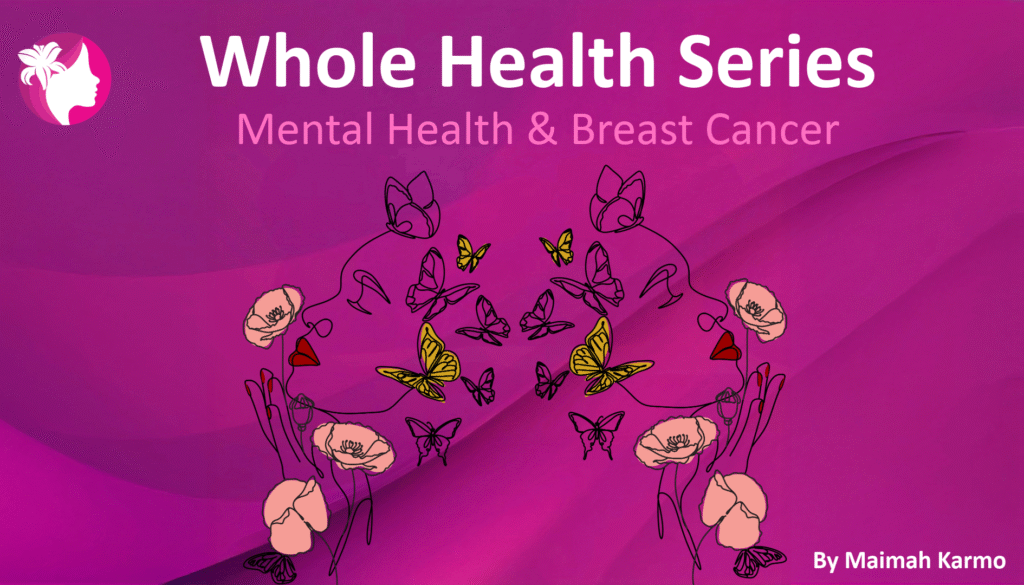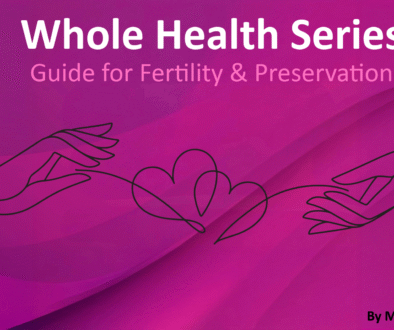Whole Health Series: Mental Health & Cancer
By Maimah Karmo
When you’re told you have cancer, the impact is not just on your body, it reverberates through your mind, spirit, and sense of self. I remember lying awake at night, my body exhausted from treatment, but my mind racing with fears: What if it comes back? How do I explain this to my children? Who will I be after this?
Cancer does not only test your physical strength; it can shake the foundations of your mental and emotional health. For me, healing wasn’t just about chemo, surgery, radiation or other treatments it was about learning how to take care of my whole self, inside and out.
Why Mental Health Matters
Mental health is essential to overall well-being. While 1 in 5 people will experience mental illness in their lifetime, everyone faces challenges that affect their mental health. For cancer patients and survivors, those challenges often feel magnified. Mental health needs can also be intensified by identity and life context. For example, Black women often face systemic inequities in diagnosis, treatment, and pain management, compounded by the cultural expectation to be the “strong one,” which can make it harder to ask for or receive support. Younger women may grapple with fertility concerns, career interruptions, dating and intimacy challenges, and the isolation of being diagnosed at an age when peers are not typically facing cancer , LGBTQI+ patients may face additional stressors fear of discrimination or misgendering in clinics, strained family dynamics, challenges around intimacy or fertility decisions, and the emotional labor of constantly self-advocating. Immigrant women, students, and those on work visas or awaiting citizenship may carry added worry about employment, insurance tied to a visa, language barriers, and fear of engaging with systems. If this is, you: we see you. Your experience is valid, and you deserve affirming, competent care.
Some of the most common mental health concerns include:
- Fear of recurrence
- Fatigue, sleep disruption, and physical pain
- Changes in body image or sexual function
- Anxiety related to treatment or test results
- Feelings of isolation or vulnerability
- Stress on relationships and communication
- Deep questions about life, mortality, and meaning
- Navigating identity-based stressors (e.g., discrimination, misgendering, family rejection)
- Practical and legal stressors (e.g., job/insurance tied to visa status, language barriers)
Managing mental health alongside treatment can be overwhelming. Depression and anxiety can make it harder to exercise, eat well, connect with loved ones, or stay on top of medical care. But there is hope. Healing may not follow a straight path, but it is possible.
Allyship & Inclusive Care
For Black women:
- Seek providers who actively listen and validate your concerns — your voice is central to your care.
- If you feel your pain or symptoms are being dismissed, advocate for second opinions or additional testing; bring an ally to appointments if possible.
- Connect with survivorship and advocacy groups centering Black women; shared spaces can affirm your experience and provide resources that reflect your reality.
- Release the pressure of the “strong Black woman” narrative — leaning on support is strength, not weakness.
For younger women:
- Be upfront about fertility, sexuality, and long-term survivorship concerns; ask for referrals to reproductive specialists or sexual health counselors early.
- Talk openly with your care team about career and financial impacts — social workers can help you navigate workplace leave, insurance, or scholarships.
- Join peer groups for young survivors; seeing yourself reflected in others can ease feelings of isolation.
- Remind yourself that your life plans are still valid, even if they take new shape after cancer.
For patients & partners (LGBTQI+):
- You deserve respectful, affirming care. Share your name and pronouns once; providers should honor them.
- Include your chosen family in appointments if that feels supportive.
- Ask for providers with LGBTQI+ competency; request privacy around sensitive history or surgeries.
For immigrants/visa holders:
- Ask for an interpreter and translated materials; it’s your right to understand your care.
- Tell your team if insurance or employment status limits access—social workers/patient navigators can help problem-solve options.
- If paperwork, transportation, or time-off is a barrier, ask about letters of support, flexible scheduling, and community resources.
For allies (family, friends, clinicians, community):
- Practice name/pronoun respect, avoid assumptions, and reflect language patients use for their bodies and relationships.
- Validate the identity, immigration, financial and offer concrete help: rides, meals, childcare, admin tasks.
- Make space for chosen family; don’t gatekeep who “counts” as support.
Taking Steps Toward Mental Wellness
Recognize your feelings. Naming your emotions is the first step toward processing them.
- Am I no longer enjoying things I once loved?
- Has sleep become an escape rather than rest?
- Do I feel persistently anxious, hopeless, or overwhelmed?
- Am I withdrawing from friends, family, or activities?
- Do I find it difficult to focus, eat, or care for myself?
Build routines that lift you up. Whether it’s journaling, walking, or prayer, consistency provides grounding.
- What small habits bring me peace, journaling, prayer, or meditation?
- Do I feel more energized when I move my body, walking, stretching, or dancing?
- Am I starting or ending my day in ways that nourish me?
- Which daily rituals remind me of who I am beyond cancer?
Remove toxic influences. Protecting your peace is just as important as caring for your body. Ask yourself:
- Do certain environments, people, or media leave me drained or anxious?
- Am I safe and respected where I receive care? If not, who can help me switch providers or advocate for me (navigator, social worker, friend, chosen family)?
- Am I setting boundaries around conversations, commitments, or relationships that feel harmful?
- What would it look like to replace negativity with affirmations, supportive voices, or uplifting activities?
Detoxing your environment creates space for healing and resilience.
Connect with others. Community, whether through friends, therapy, or support groups is a powerful medicine.
- Who in my life makes me feel safe, seen, and supported?
- Am I leaning on friends, family, faith communities, or support groups when I need them?
- Have I found communities that reflect my identity and needs (e.g., LGBTQI+ survivor groups, immigrant support orgs, faith/spiritual spaces, campus networks)?
- Would talking to a therapist, mentor, or survivor network help me feel less alone?
- How can I practice asking for help without feeling guilty?
Connection is a powerful medicine. Let others remind you that you are not alone on this journey.
You Are Not Alone
Checking in with yourself regularly helps you notice when something deeper may be happening. Remember: noticing these shifts is not weakness, it’s wisdom. The earlier you recognize patterns; the sooner you can seek support and begin healing.
Routines don’t have to be big to be powerful. Even a few minutes of intentional practice each day can create stability and remind you that healing is not only physical, but also emotional and spiritual, too. Detoxing your environment creates space for resilience. And connection is a powerful medicine. Let others remind you that you are not alone on this journey.
If you are dealing with depression, anxiety, or thoughts of suicide, know this: your feelings are valid, and your life matters. Suicide prevention begins with conversation, compassion, and connection.
If you or someone you love is in crisis, call or text 988 in the U.S. for the Suicide & Crisis Lifeline. Trained counselors are available 24/7.
By caring for your mind as intentionally as your body, you create a more empowered narrative. Small acts of self-compassion ripple outward, uplifting you and everyone connected to you. Remember: mental health is whole health.




